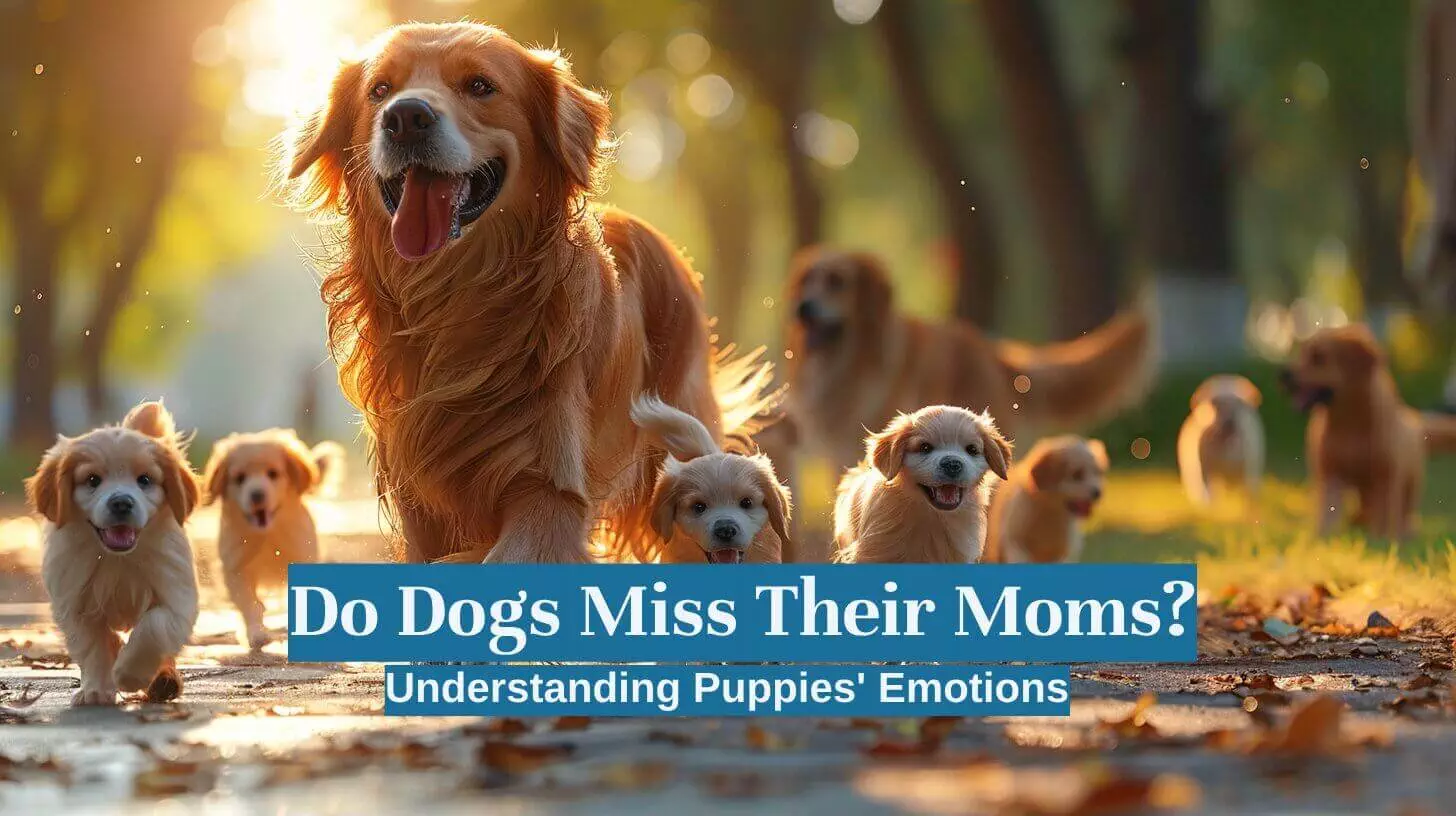Have you ever wondered if dogs feel sad when they leave their moms? The truth is, yes, they do! Just like us, dogs form a special bond with their mothers, which makes the question “do dogs miss their moms? ” an important one for pet owners to understand. Research has shown that dogs are capable of experiencing a range of emotions, including sadness and attachment. When they are separated from their mothers or other loved ones, they may exhibit signs of distress or anxiety, indicating that they truly miss those bonds. This emotional depth is also reflected in instances of dogs sensing deceased loved ones, showcasing their ability to understand loss in a way that resonates deeply with humans.
In this article, we’ll explore the incredible bond between puppies and their mothers, how separation can affect their emotions, and the signs that show a puppy might be missing their mom. You’ll also learn how to support your new furry friend as they grow and develop during those crucial early weeks. So, let’s dive into the world of puppy feelings and discover how to help them thrive!
Do Puppies Miss Their Moms?

Understanding the Bond Between Puppies and Their Mothers
Puppies are born completely dependent on their mothers. For the first few weeks, they rely on their mothers for warmth, food, and hygiene. This bond is crucial for their emotional and physical development. The mother provides not just nourishment, but also safety and comfort. This close relationship helps puppies learn about trust and love. Without this bond, puppies may struggle to feel secure as they grow.
During the early weeks, mothers are attentive to their puppies. They lick them clean and keep them warm. This care is essential for healthy development. Puppies learn vital life skills from their mothers. The experience of being nurtured shapes their future interactions with humans and other dogs. This bond is a foundation for their emotional health. [American Kennel Club]
How Separation Affects Puppies Emotionally
When puppies are separated from their mothers, they can feel distressed. This separation can create feelings of anxiety and confusion. Puppies may not understand why they are alone, leading to emotional distress. Research shows that this emotional turmoil can affect their behavior and development. Anxiety in puppies can lead to issues such as excessive barking or destructive behaviors.
The impact of separation is particularly strong during the first few weeks of life. Puppies may not have developed the coping skills needed for being alone. They might cry or whine when they miss their mother. This emotional state can lead to longer-term behavioral issues if not addressed properly.
Signs That Puppies Miss Their Mom
Puppies display several signs when they miss their mothers. Common behaviors include:
- Whining or Crying: This is a direct way for puppies to express their distress.
- Searching: Puppies may roam around looking for their mother.
- Changes in Eating Habits: They might lose interest in food or eat less than usual.
- Signs of Anxiety: This can include pacing or displaying nervous behaviors.
- Clinginess: Puppies may want to stay close to their new owners or other pets.
- Destructive Behavior: Some puppies may chew on objects or dig in an attempt to cope with their feelings.
| Sign | Description |
|---|---|
| Whining or Crying | Expresses distress and longing for mom |
| Searching | Roaming around looking for their mother |
| Changes in Eating | Less interest or refusal to eat |
| Signs of Anxiety | Pacing or displaying nervous behaviors |
| Clinginess | Wanting to stay close to people or pets |
| Destructive Behavior | Chewing or digging to cope with feelings |
The Importance of the Mother-Puppy Bond

How Attachment Develops in the First Weeks
The bond between puppies and their mothers starts at birth. In the first weeks, puppies depend on their mothers for food and warmth. This early reliance is crucial for their emotional and physical growth. The mother engages in nurturing behaviors, like licking and grooming, which help puppies feel safe and secure.
As they grow, puppies learn to recognize their mother’s scent and voice. This recognition strengthens their attachment. The bond formed during these early days sets the foundation for a puppy’s future relationships. Puppies develop trust and learn to explore the world with confidence. This attachment is vital for their emotional health as they transition into adult life.
Research shows that this bond can last. Puppies can remember their mothers for up to two years after separation. This remarkable memory highlights the importance of the mother-puppy connection during early stages of life. [Pubmed]
Exploring Puppy Training and the Role of the Mother
A mother’s role goes beyond just providing food. She teaches essential social skills. During their first weeks, puppies learn how to interact with their environment and other dogs through play. They observe their mother and siblings, picking up important lessons about behavior. This early socialization is crucial. It helps puppies grow into well-adjusted adult dogs.
A mother dog uses gentle corrections to guide her puppies. For instance, if a puppy bites too hard during play, the mother will yelp. This teaches the puppy about bite inhibition. It helps them understand the boundaries of acceptable behavior. Such lessons are important for preventing future behavioral issues.
Without a mother’s guidance, puppies may face training challenges later in life. They might struggle with social interactions or exhibit destructive behavior. Therefore, the early training and socialization provided by their mother lay the groundwork for a puppy’s future behavior.
The Need for Love and Comfort from Their Mom
Puppies thrive on affection and comfort from their mothers. Maternal care offers emotional security that is vital for their overall well-being. When puppies are close to their mother, they feel safe. This feeling allows them to explore their surroundings without fear.
During stressful situations, like the weaning process, puppies often seek their mother for comfort. They rely on her presence to ease anxiety. Signs of distress may include whining or searching for their mother. These behaviors show how much they value the emotional support she provides.
Maternal care also helps puppies develop healthy attachment styles. This bond influences their ability to form connections with humans and other pets. When puppies receive love and comfort, they develop a sense of trust. This trust is essential for forming strong bonds with their future families. Understanding the need for maternal love can help pet owners better support their puppies during the transition to a new home.
| Puppy Development Stages | Age Range | Key Developmental Features |
|---|---|---|
| Neonatal Phase | 0-2 weeks | Dependence on mother for warmth and food. |
| Transitional Phase | 3-4 weeks | Exploring surroundings, beginning to play. |
| Socialization Phase | 5-12 weeks | Learning social skills, bite inhibition. |
Anxiety in Puppies When Separated from Their Mom

Understanding Puppy Separation Anxiety
Puppies often experience separation anxiety when away from their mothers. This condition happens because puppies depend on their mothers for comfort and security in early life. When separated, they may show signs of distress, such as excessive barking, whining, or even destructive behavior. Puppies can feel scared or anxious, especially in a new environment. Understanding this anxiety helps pet parents support their adorable puppies.
Veterinary sources confirm that separation anxiety is common in puppies and can lead to long-term behavioral issues if not addressed. Typically, this anxiety appears around 8 weeks of age. At this stage, puppies start to rely less on their mothers due to the weaning process. Recognizing the signs early allows pet parents to take steps to ease their puppy’s distress.
Tips for Easing Anxiety in Young Puppies
Easing a puppy’s anxiety when separated from their mother can significantly improve their well-being. Here are effective strategies for pet parents:
| Tip | Description |
|---|---|
| Gradual Alone Time | Start leaving the puppy alone for short periods, gradually increasing the time. |
| Comfort Items | Provide items that smell like their mother, such as soft blankets or toys. |
| Consistent Routine | Establish a routine for feeding, playtime, and potty breaks to help them feel secure. |
| Positive Reinforcement | Reward the puppy with treats or praise when they stay calm during short departures. |
| Engaging Toys | Use puzzle toys or chew toys to keep them occupied and distracted. |
| Professional Help | Consult a veterinarian or animal behavior consultant if anxiety persists. |
Sources
The Stages of a Puppy’s Development

Puppies go through important growth stages that shape their behavior and emotions. Understanding these stages can help owners provide the right support. There are three main phases of development: neonatal, transitional, and socialization. Each stage plays a key role in how puppies grow up, both physically and emotionally.
Key Developmental Milestones in Puppy Growth
The neonatal period lasts from birth until about two weeks old. During this time, puppies rely heavily on their mother. They cannot see or hear well, and they depend on her for warmth and food. The next phase, the transitional period, lasts from two to four weeks. Puppies begin to open their eyes and ears and start to walk and play. This phase is crucial as they learn basic social skills from their mother and littermates.
Between five and twelve weeks, puppies enter the socialization period. This phase is vital for developing their social skills. Puppies learn how to interact with other dogs, people, and different environments. Positive experiences during this time can help shape a well-adjusted adult dog. For instance, early exposure to various sights and sounds can prevent fear and anxiety later in life.
How Age Influences Puppies’ Ability to Cope Without Their Mom
Age greatly affects how well puppies handle separation from their mother. Puppies younger than eight weeks are more likely to struggle. They depend on their mothers for food, comfort, and security. The separation can lead to anxiety and distress.
As puppies grow older, they become more independent. By the time they are eight to twelve weeks old, they have developed more coping skills. However, they may still show signs of missing their mother. Gradual exposure to new experiences can help ease this transition. For example, spending short periods apart can prepare them for longer separations.
The Impact of Littermates on a Puppy’s Emotional Health
Littermates play an important role in a puppy’s emotional health. Living with siblings helps puppies learn vital social skills. They learn to play, communicate, and even resolve conflicts. These experiences are crucial for their development.
If puppies are separated from both their mother and siblings too early, they may feel lonely. This loneliness can lead to behavioral issues later in life, such as separation anxiety. A puppy that grows up with littermates is more likely to develop healthy social behaviors. Thus, keeping puppies with their siblings until they are at least eight weeks old is recommended.
Preparing Your Puppy for Life Away from Their Mom

Steps to Take Before Bringing a Puppy Home
Preparing for a new puppy involves several essential steps. First, create a safe space for your puppy. This area should be free of hazards like sharp objects or toxic plants. A cozy bed and chew toys can make the space feel welcoming.
Next, gather essential supplies. Items you need include food bowls, food, a leash, and a collar. Puppies also need chew toys to help with teething. Establishing a daily schedule can help the puppy adjust. A routine that includes feeding times, play, and potty breaks will provide structure and comfort.
Lastly, learn about the breed of your puppy. Each breed has unique needs and behaviors. Understanding these can help you provide adequate care.
Techniques for Building a New Bond with Your Dog
Building a bond with your new puppy takes time and patience. Spending quality time together is one of the best ways to connect. This can include playing fetch or just cuddling. Engaging in interactive play helps form a strong bond through positive experiences.
Positive reinforcement is another effective technique. Rewarding good behavior with treats or praise encourages the puppy to repeat those actions. This approach helps establish trust and respect between the puppy and its new owner.
Establishing a daily routine also strengthens the bond. A consistent schedule for feeding, walks, and playtime helps the puppy feel secure. Over time, the puppy will learn to associate you with comfort and care.
Offering Support as Your Puppy Adjusts to Their New Home
Adjusting to a new home can overwhelm a puppy. Offering support during this transition is essential. Being patient and understanding will help the puppy feel safe. It’s normal for puppies to feel nervous in a new environment.
Maintaining a consistent routine is vital for stability. This means sticking to feeding and potty schedules as much as possible. A predictable environment can ease anxiety for a puppy.
If your puppy shows signs of anxiety, comforting items can help. A favorite toy or a blanket that smells like their mother can provide reassurance. If anxiety persists, consult a veterinarian to explore further options.
| Age Range | Common Behaviors | Tips for Support |
|---|---|---|
| 4-5 weeks | Whining, searching | Provide comfort items |
| 5-6 weeks | Increased curiosity | Create a safe space |
| 6-8 weeks | Separation anxiety | Stay calm and consistent |
| 8-12 weeks | Pacing, chewing | Establish a routine |
| 10-12 weeks | Socialization needs | Engage with other puppies |
Conclusion
In this article, we discovered that puppies do indeed miss their moms! The bond between a puppy and its mother is deep and important, helping them feel safe and loved during their early weeks. We also learned how separation can lead to anxiety, and that puppies may show signs of missing their mothers through behaviors like whining or excessive barking.
As you prepare to welcome a new puppy into your home, remember that providing adequate care and comfort will help ease their transition. By understanding their emotional needs and the stages of their development, you can create a loving environment that helps your puppy thrive. Keep exploring the amazing world of puppy emotions, and you’ll be well on your way to building a strong bond with your furry friend!
FAQs
1. Do puppies miss their moms after they leave?
Yes, puppies do miss their moms. They form a strong emotional bond during the first few weeks, and separation can lead to distress. Puppies may show signs like crying, whining, or searching for their mother, especially if they are separated too early.
2. At what age should puppies be separated from their mother?
The ideal age for separation is 8 weeks old. Before this, puppies rely on their mother for emotional support and nourishment. Separation earlier than this can cause anxiety and affect their social development.
3. How do puppies express that they miss their mom?
Puppies show they miss their mom through behaviors like whining, restlessness, seeking comfort, or destructive behaviors. They may also lose interest in food or become clingy with their new family.
4. Can puppies remember their mom after separation?
Yes, puppies can remember their mother for up to two years after separation. This is due to their ability to form associative memories during their early development, especially through scent and voice recognition.
5. How can I help my puppy adjust after being separated from its mom?
To ease the transition, provide comfort items like toys or blankets that smell like their mom. Establish a consistent routine for feeding and playtime to help them feel secure, and be patient as they adjust to their new home.

